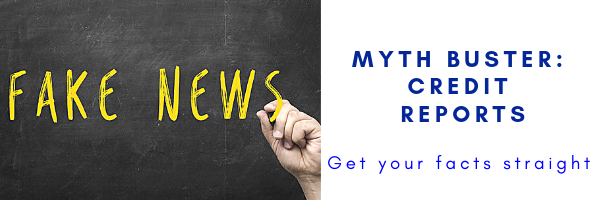
Myth Busters: Credit Reports
Myth 1: If You Have a Poor Credit History You Will Be on the Credit Blacklist
We hope that you are sitting down for this shock revelation ... there is actually no such thing as a credit blacklist. That is right, even though it is referred to a lot in the world of finance, it does not exist.
When you make an application for credit, the decision on whether to lend to you is based in your current debt owed, your repayment history and the individual lender's criteria. There is no set criteria that is used across all lenders when making a lending decision.
So if your application has been rejected by one lender, it does not necessarily mean that another will not accept you.
Myth 2: Missed Payments Will Stay on Your Credit Report Forever
Information on your financial history (for example late or missed payments) usually stays on your report for around six years after the account has been settled or defaulted. After this time it is likely to be removed.
Myth 3: If You Have a Low Credit Score You're Stuck With It
Just because your credit score is not where you would like it to be now, it does not mean that it will not ever improve. Remember, because your credit score is calculated from your personal informaton and financial history if this changes, there is a chance your score may do to.
Have a look at our tips on How to Build Your Credit Score >>
Myth 4: Your Score Will Be Excellent Because You Have Never Borrowed Money
Lenders like to see that you can manage your credit responsibly by paying back (on time) any money that you borrow. If you have never borrowed any money, or have only taken out a small amount of credit it is much more difficult for the lenders to see how you manage your credit. Sometimes this can have a negative impact on your credit score with lenders assuming that you are a high risk, meaning that it will be more difficult for your to obtain credit.
That does not mean that you should attempt to borrow large amounts of money that you will struggle to pay back. To build a good credit score you need to show that you are responsible with your finance by proving that you can pay back what you borrow.
Myth 5: You Are Rich, So Your Credit Score is the Best it Can Be
Savings and how much money you have in your current account have no impact on your credit score. Your credit score is a representation of your credit history - what you have borrowed and how you managed paying it back. So even if you have millions in the bank, if you previously defaulted on payments or if you have never borrowed money, your credit score could still be low.
How to Build You Credit Score - Key Points:
- There is no such thing as a credit blacklist
- Missed payments generally only stay on your credit report for six years
- You can build on a low credit score
- If you have never borrowed money, you may have a lower credit score
- Just because you have a lot of money it does not mean your credit score will automatically be good
Why You Should Check Your Credit Report >>
Editorial Disclaimer: This article was updated 30th March 2019
Opinions expressed here are the author's alone, and not those of any bank, credit card issuer or any other company. This article has not been reviewed, approved or otherwise endorsed by any of these organisations.